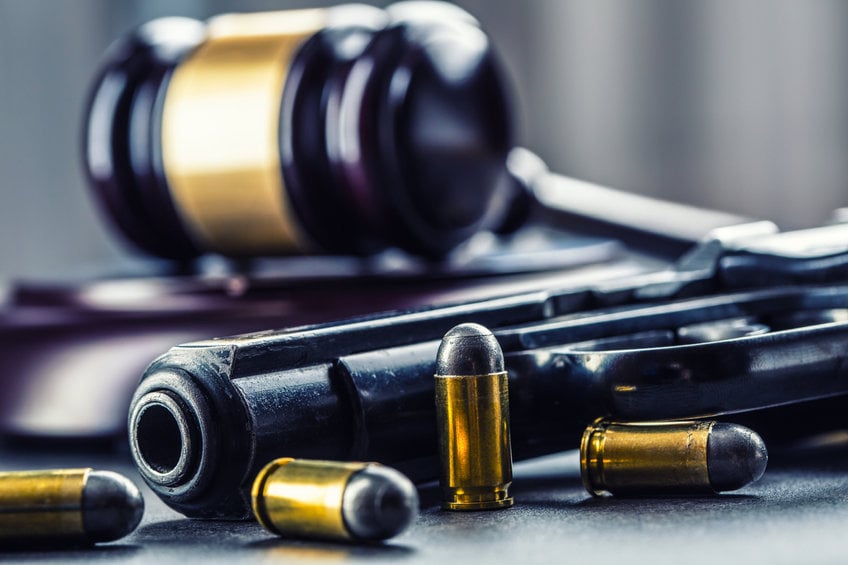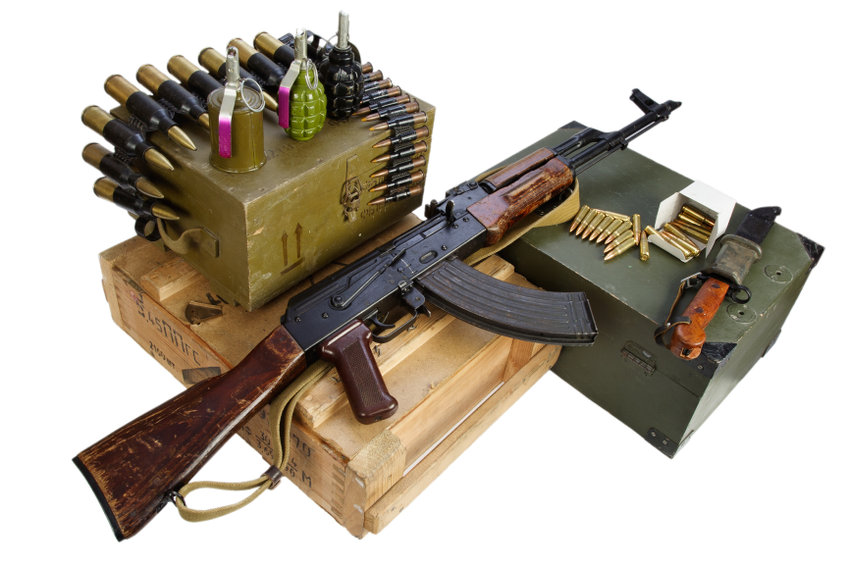Misconduct Involving Weapons
Misconduct involving weapons is a felony offense in Arizona involving a person’s illegal use or possession of a firearm or deadly/prohibited weapon. The criminal offense is defined by the Arizona Revised Statutes 13-3102.
It is important to understand which “weapons” are subject to the statute. Arizona law defines a “deadly weapon” as anything designed for lethal use, including a firearm. A knife or machete are also examples of deadly weapons.
Arizona law defines “firearm” as any loaded or unloaded handgun, pistol, revolver, rifle, shotgun, or other weapon that will expel, is designed to expel, or may readily be converted to expel a projectile by the action of an explosive. It excludes any firearm that is in a permanently inoperable condition.
At Lerner and Rowe Law Group, we know that misunderstandings happen all the time. You could, in fact, be wrongfully accused of a weapons charge. That is why it is extremely important to contact our Phoenix criminal defense lawyers as soon as you’re charged. Then, we can evaluate your case and discuss your best possible defense that may help limit collateral consequences.
What Is Misconduct Involving Weapons?
The misconduct involving weapons statute punishes over 15 types of conduct, each of which is summarized below:
1. Carrying a deadly weapon in specific circumstances (Class 6 felony) with the exception of a pocket knife concealed on his person or within his immediate control in or on a means of transportation:
(a) In the furtherance of a serious offense as defined in section 13-706, a violent crime as defined in section 13-901.03 or any other felony offense;
OR
(b) When contacted by a law enforcement officer and failing to accurately answer the officer if the officer asks whether the person is carrying a concealed deadly weapon
2. Under 21 and concealing a deadly weapon (Class 3 misdemeanor). It is unlawful for a person under 21 years of age to carry a deadly weapon except a pocket knife concealed on his person or concealed within his immediate control in or on a means of transportation.
3. Manufacturing, possessing, transporting, selling or transferring a prohibited weapon (Class 4 felony). It is unlawful for someone to possess, transport, or sell a prohibited weapon.
Prohibited weapons include the following:
- Grenades, bombs, rockets, and mines.
- Fully-automatic firearms. In Arizona, fully automatic firearms are not allowed without special licenses or permits. Fully-automatic means one press of the trigger results in multiple rounds being fired. Semi-automatic firearms (A firearm that is capable of shooting more than one shot automatically, without manual reloading, by a single function of the trigger) are allowed.
- A rifle with a barrel length of less than 16 inches, or shotgun with a barrel length of less than 18 inches, or any firearm that is made from a rifle or shotgun and that, as modified, has an overall length of fewer than 26 inches.
- Silencer or suppressor. Any equipment used to suppress the sound of a firearm is illegal.
- Molotov cocktails. A breakable container that contains a flammable liquid with a flash point of 150 degrees Fahrenheit or less and that has a wick or similar device capable of being ignited. A chemical or combination of chemicals, compounds or materials, including dry ice, that is possessed or manufactured for the purpose of generating a gas to cause a mechanical failure, rupture or bursting or an explosion or detonation of the chemical or combination of chemicals, compounds or materials.
- Improvised explosive devices (IEDs).
4. Being a prohibited possessor (Class 4 felony) and possessing a deadly weapon or prohibited weapon. This type of offense is what is referred to as a “status crime” as it only impacts a certain class of people i.e. someone who was convicted of a felony who did have their rights to possess a firearm restored.
5. Selling to a prohibited possessor (Class 6 felony).
6. Defacing a deadly weapon (Class 6 felony).
7. Possessing a defaced deadly weapon (Class 6 felony) and knowing the deadly weapon was defaced.
8. Using a deadly weapon during the commission of a felony (Class 4 felony) if the felony offense is included in chapter 34 of this title.
9. Shooting at an occupied structure (Class 3 felony) if it’s done to assist, promote or further the interests of a criminal street gang, a criminal syndicate or a racketeering enterprise. Often this is seen in the drive-by shooting context.
10. Failure to Remove a Firearm (Class 1 misdemeanor) when lawfully asked to do so when entering any public event or establishment, unless specifically authorized by law.
11. Entering an election polling place on the day of any election carrying a deadly weapon (Class 1 misdemeanor), unless specifically authorized by law.
12. Possessing a deadly weapon on school grounds (Class 1 misdemeanor).
13. Entering a nuclear or hydroelectric generating station carrying a deadly weapon (Class 4 felony), unless specifically authorized by law.
14. Furthering a felony (Class 3 felony). It is illegal to supply, sell or giving possession or control of a firearm to another person if the person knows or has reason to know that the other person will use the firearm in the commission of any felony.
15. Facilitating terrorism (Class 2 felony). Using, possessing or exercising control over a deadly weapon in furtherance of any act of terrorism as defined in section 13-2301 or possessing or exercising control over a deadly weapon knowing or having reason to know that it will be used to facilitate any act of terrorism as defined in section 13-2301;
16. Furthering gang activity (Class 3 felony). Trafficking in weapons or explosives for financial gain in order to assist, promote or further the interests of a criminal street gang, a criminal syndicate or a racketeering enterprise. Although there are multiple acts that may lead to a misconduct involving weapons charge, by far the most common offense charged is possession of a firearm by a convicted felon who did not have their gun rights restored. In this scenario, it’s often that a person’s contact with law enforcement is unexpected and occurs during something like a traffic accident that results in the search of the vehicle, revealing the presence of a weapon. Another common scenario is police responding to a home following a call of a domestic disturbance and during a search of the home police find a firearm and link it to the prohibited possessor.
Six Classes of Prohibited Possessors
Being legally characterized as a prohibited possessor goes beyond just having a prior felony conviction. There are 6 classes of people who are considered “prohibited possessors” under ARS code 13-3101(7) summarized below:
- A person who has been convicted felony and has not had their gun rights restored
- A person who has been found to be a danger to themselves and/or others
- A person who has acute or grave disabilities pursuant to section ARS 36-540
- A person who has been convicted of a felony in Arizona or any other state
- A person who is currently imprisoned in any detention center or correctional facility
- A person who is currently on probation for a felony offense, community supervision, work furlough, home arrest, or has been released on any other basis and who is serving probation or parole pursuant to the interstate compact under title 31, chapter 3, article 4.1
- A person who is currently serving probation for any domestic violence offense as defined in ARS section 13-3601
Charged With Misconduct Involving Weapons?
If you aren’t sure whether you have the right to lawfully possess a firearm or want to have your gun rights restored, contact the affordable Phoenix criminal defense lawyers with the Lerner and Rowe Law Group.
We can also help you if you’ve been charged with any of the misconduct involving weapons offenses above by preparing a strong defense to the charge.
Call us today at 602-667-7777 or start a LiveChat here on the website. We offer 24/7 representation and free, confidential consultations.



